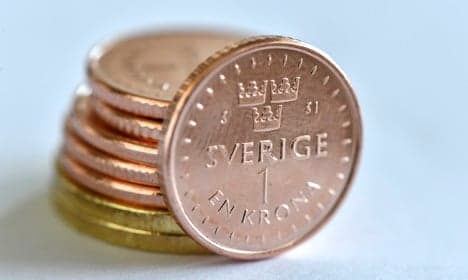Sweden to keep record-low interest rate in 2017

Sweden's central bank has announced that the country's record-low interest rate of -0.50 percent will remain in place longer than previously planned, with the rate now not due to be changed until 2018.
Earlier this year the Riksbank said that uncertainty caused by Britain’s vote to leave the EU meant the country’s negative interest rate would stay in place until the second half of 2017. On Thursday however it announced that the rate will now remain unchanged until early 2018, sighting a slower than expected rise in inflation.
“The Riksbank now assesses that it will take longer for inflation to reach two percent. The upturn in inflation therefore needs continued strong support,” the Riksbank wrote in a press release.
Sweden took the landmark decision to slash the repo below zero in February 2015, hoping that the financial strategy would boost inflation to raise the price of everyday goods and services which had been stagnant in recent years, and therefore improve the Nordic nation’s economic prospects.
It now predicts that inflation will reach 1.4 percent in 2017, a downward adjustment from the 1.8 percent forecast in a previous estimation. By 2018 the Swedish central bank expects inflation to reach 2.2 percent.
“However, in recent months inflation has slowed down, which illustrates the uncertainty over how quickly inflation will rise towards the target,” the Riksbank's press release explained.
The Riksbank also noted that a monetary policy meeting in December could lead to an extension of its programme of purchasing government bonds. By the end of 2016 it will have purchased bonds worth 245 billion kronor ($27.5 billion).
Thursday’s announcement did not immediately lead to any strong reactions, with the Swedish krona weakening marginally against the US dollar and the euro.
Comments
See Also
Earlier this year the Riksbank said that uncertainty caused by Britain’s vote to leave the EU meant the country’s negative interest rate would stay in place until the second half of 2017. On Thursday however it announced that the rate will now remain unchanged until early 2018, sighting a slower than expected rise in inflation.
“The Riksbank now assesses that it will take longer for inflation to reach two percent. The upturn in inflation therefore needs continued strong support,” the Riksbank wrote in a press release.
Sweden took the landmark decision to slash the repo below zero in February 2015, hoping that the financial strategy would boost inflation to raise the price of everyday goods and services which had been stagnant in recent years, and therefore improve the Nordic nation’s economic prospects.
It now predicts that inflation will reach 1.4 percent in 2017, a downward adjustment from the 1.8 percent forecast in a previous estimation. By 2018 the Swedish central bank expects inflation to reach 2.2 percent.
“However, in recent months inflation has slowed down, which illustrates the uncertainty over how quickly inflation will rise towards the target,” the Riksbank's press release explained.
The Riksbank also noted that a monetary policy meeting in December could lead to an extension of its programme of purchasing government bonds. By the end of 2016 it will have purchased bonds worth 245 billion kronor ($27.5 billion).
Thursday’s announcement did not immediately lead to any strong reactions, with the Swedish krona weakening marginally against the US dollar and the euro.
Join the conversation in our comments section below. Share your own views and experience and if you have a question or suggestion for our journalists then email us at [email protected].
Please keep comments civil, constructive and on topic – and make sure to read our terms of use before getting involved.
Please log in here to leave a comment.